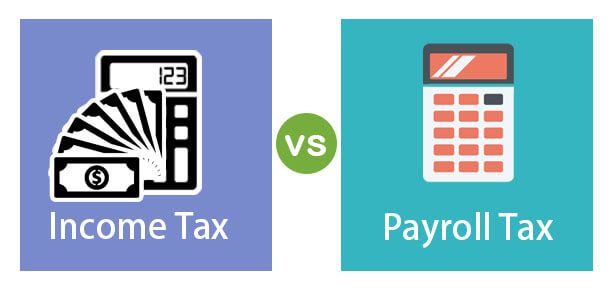Table Of Contents
Difference Between Income Tax and Payroll Tax
Income tax is the tax imposed by government authorities on the net income earned by individuals or business entities which is progressive where the person earning higher income has to pay income tax at a higher rate of interest and vice versa, whereas, Payroll tax refers to the tax which includes social security tax, taxes for medical care and unemployment taxes, etc. where both employer and an employee contribute such tax.
Employers are responsible for holding part of the wages given to the employees as employment taxes. Employment taxes are deducted from the employee’s gross wages in two types.

- Income tax consists of local, state, and federal taxes. The taxes vary from place to place as some localities charge an additional local income tax. Most states have their state income tax and payroll tax. The federal income taxes can be exempted by claiming on Form W-4. The employer holds back a part of the income. This portion of the tax is due to be paid either to the local, state, or federal departments. Once the tax dues are paid, the employers pay back this withheld income to the employees.
- Payroll taxes consist of unemployment taxes and social security taxes. It is the type of tax where both the employer and the employee contribute towards it. Medical care and social security taxes are also known as FICA (Federal Insurance Contributions Act) tax. The social security tax that the employee pays determines the monthly payments they get after their retirement. The Federal Unemployment Tax Act (FUTA) provides insurance if a previous employee is unemployed, and the Medicare tax provides the cost of medical expenses after the employee retires at the age of 65.
Income Tax vs. Payroll Tax Infographics
Let’s see the top differences between Income Tax vs. Payroll Tax.

Income Tax vs Payroll Tax - Video Explanation
Key Differences
- One of the main differences is the person that contributes to them. When we look at income tax, the whole tax amount is for the employee to pay. When you look at payroll tax, the employer and employee share the tax amount equally.
- Income tax consists of taxes that the employees pay for the location (like a local tax that is paid for the locality where you stay), the state tax that you pay for the state that you live in, and the federal tax for the government. Payroll tax consists of taxes like medical care tax, unemployment tax, and social security tax.
- Income taxes are taxes for various incomes that a person receives. This income can be paid weekly or monthly, or even daily. Apart from wages, it can be through rent from their own house, investments made in shares, interest from banks, etc. Payroll taxes are generally calculated only through the employee's wages, the income a person receives through his job/employment.
- Income tax is more of a progressive tax because as the salary of the employee increases, the income tax is also increased by the level of pre-determined income slabs. Comparatively, the payroll tax is regressive tax as the slabs are fixed such that high-income people pay as much as low-income people.
- Income taxes are generally paid for the governments to function. Payroll taxes benefit the taxpayers directly as these taxes will help them with Medicare and retirement funds. Even though income taxes help the taxpayers indirectly in some way, the payroll tax is the one that helps the taxpayers directly.
Income Tax vs. Payroll Tax Comparative Table
| Basis for Comparison | Income Tax | Payroll Tax |
|---|---|---|
| 1. Contributors | Only employee. | Both employer and employee. |
| 2. Consists of | Federal, state, and local tax; | Medicare tax, unemployment tax, and social security tax; |
| 3. Source | Incomes from various sources are taken into consideration over the year. | Income from wages can only be considered. |
| 4. Nature of tax | Progressive Tax. | Regressive Tax. |
| 5. Purpose | More for contribution to the government, society at large; | More for employee's future benefits; |
Final Thoughts
We know that both taxes have their differences, but both tax amounts are withheld by the employers while giving the wages. Both taxes are being made to pay for different reasons, and we need to know how much taxes we pay and how they are split. Understanding the differences will help us figure out each type of tax and how they work.
